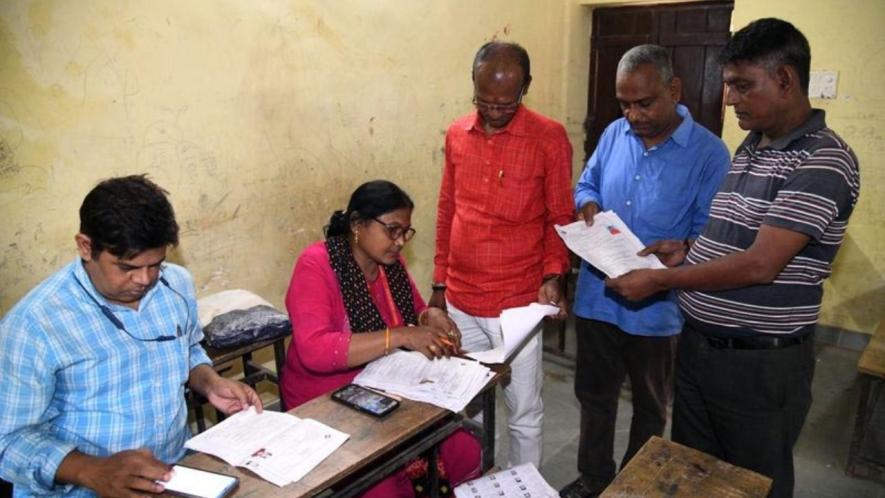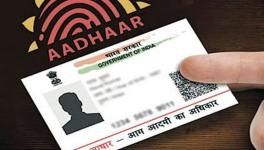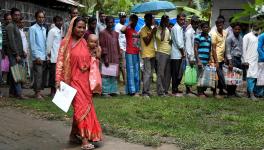SIR in West Bengal: Reform or a Tool For Exclusion?

Image: The Tribune
Kolkata: Malati Jain, 35, has been a resident of Kolkata since her birth. With roots in Uttar Pradesh, her parents’ grandfathers had moved to Kolkata and had invested heavily in the tannery business. Malati still has a tannery unit running in her name in the leather complex of Bantala. A single mother, divorced at the age of 24 with a two-year-old child, Malati, who now owns a Honda City car, has been running from pillar to post to get her expired passport revalidated to give it as proof of residency during the Special Intensive Revision (SIR) of electoral rolls being carried out by the Election Commission of India (ECI).
“My voter ID card and Aadhaar card are in my estranged in-law’s house, from where I do not get any co-operation. Because I am not interested in politics, I didn’t care about this. But, now, this SIR has created a messy situation for me”, she told NewsClick.
If this is the condition of a business magnate grappling with SIR, then one can imagine the plight of many other sections of society, including college professors.
Shrabani is a college professor in a Kolkata city college. Recently, she has bought a flat of her own in Garia in South Kolkata. But before she could settle down, her woes began. She has migrated from her earlier address and now wants a new voter ID card in the present address, but SIR has made the entire process complicated for her. She said she visited the BLO’s (Booth Level Officer involved in voter list revision) office twice, but failed to meet her.
The situation of household or domestic workers, such as Rina, Jamuna and Tanushree is worse. The entire SIR exercise has forced them to be absent from their homes where they work. They have been running around to get the documents from their villages to be validated, as during day they seldom stay in their village homes.
A new trend has emerged in the villages of South 24 Parganas and Murshidabad district. Life has returned to the abandoned hutments (due to migration) in these areas, as those who had moved out are returning to the villages to be present during the SIR exercise.
The SIR exercise by ECI in West Bengal has become more than a bureaucratic exercise—it is now a contested terrain of democracy itself.
Democracy Under Scrutiny
The SIR, launched in November 2025, is meant to launch a full-scale verification of West Bengal’s electoral rolls. Unlike routine summary revisions, this exercise digs deeper: voters must reconcile their details with the 2002 electoral roll, the last time such an intensive revision was conducted in the state. The Election Commission insists this is necessary to weed out duplication, errors, and ghost entries. But the process has already sparked controversy and confusion.
The Mechanics of SIR
Door-to-door verification: BLOs are tasked with visiting households, distributing forms, and cross-checking names against the 2002 roll.
Forms and hearings: Citizens must fill Annexure III/IV forms, often without clear guidance. Mistakes—wrong columns, whitener marks, or missing photos—can trigger deletion notices.
Digital hurdles: The ECINET portal and OTP-based e-signatures have faced outages, leaving many voters stranded mid-process.
Diaspora voters: Online SIR forms are available for those outside the state, but accessibility remains patchy.
Political Faultlines
The SIR has quickly become a political battlefield.
The Opposition Bharatiya Janata Party (BJP) has been alleging that Chief Minister Mamata Banerjee, leader of the ruling Trinamool Congress (TMC) is resisting the revision to “shield a fraudulent voter base”.
The TMC’s has counter-charged BJP. Banerjee has written to the ECI, terming the exercise “unplanned and coercive,” warning that it endangers both citizens and officials.
There are some absurd anomalies, too, such as demographic mismatch—like a mother listed as younger than her son— which have been flagged by BJP leader Suvendu Adhikari, further amplifying the claims of systemic flaws.
The Human Cost
Behind the political noise lies the ordinary voter. Many fear disenfranchisement due to clerical errors or missed BLO visits. Forms distributed at tea stalls, unacknowledged submissions, and overburdened officials paint a picture of administrative fatigue. For rural and marginalised communities, the risk is stark: a single mistake could mean exclusion from the democratic process.
Why a Transparent Process Matters
Electoral rolls are the foundation of democracy. In West Bengal, where political contestation is fierce and voter turnout is historically high, the stakes are immense. A flawed voter list revision could tilt the balance of representation, while a transparent and accurate roll could restore faith in the electoral process.
From a Journalist’s Lens
One must emphasise the intersection of bureaucracy and lived reality during the SIR process, which is not just about names on paper, but about the fragile trust between citizens and the State. The narrative is layered.
Democracy is a lived experience. Today, a farmer in Birbhum, a migrant worker in Howrah, or a student in Kolkata—all stand at the mercy of forms and hearings.
Also, there is lack of systemic accountability. The ECI’s intent may be reform, but its execution exposes the cracks in India’s electoral machinery.
It is, therefore, necessary that the civil society, media and political actors now take responsibility to ensure that the SIR does not become a tool of exclusion.
In West Bengal, SIR has become more than a technical correction—it is a test of democratic resilience. Whether that strengthens the electoral process or deepens mistrust will depend not just on the ECI but on how society responds to the anxieties of its voters.
The Political Theatre
West Bengal’s political landscape is such that even a bureaucratic exercise like SIR has become a flashpoint of contestation
Leaders of the BJP, which is ruling at the Centre but is in Opposition in West Bengal, have alleged widespread irregularities, pointing to absurd anomalies such as mothers listed younger than their sons, but leaders like Adhikari also argue that the revision is essential to restore ECI’s credibility.
The ruling TMC in Bengal is, however, resisting the process of SIR, with the Chief Minister accusing the ECI of coercion, calling the process “unplanned” and warning that it risks disenfranchising genuine voters.
There are growing concerns from the Left parties and the civil society as well. They worry that marginalised communities—rural poor, migrant workers, minorities—are most vulnerable to exclusion because of bureaucratic hurdles.
The SIR, thus, has become more than a technical correction. It has turned into a proxy battle over legitimacy and representation.
The Human Dimension
The ordinary voter is the worst sufferer amid the entire SIR process.
Rural anxieties: Farmers in Birbhum or tea workers in Jalpaiguri often lack clarity on forms and deadlines. A single clerical error could erase their democratic voice.
Urban confusion: Students and professionals in Kolkata are facing digital hurdles, such as failed OTPs, inaccessible portals and unclear instructions.
Diaspora challenges: Online forms exist for voters outside the state, but accessibility remains uneven.
For many, the process feels less like a safeguard and more like a test of endurance against bureaucracy.
Electoral rolls are the bedrock of democracy. In West Bengal, where turnout often exceeds national averages, the stakes are immense, as a flawed roll risks systematic disenfranchisement.
Malda District – A Farmer’s Dilemma
A 62-year-old farmer in Malda reported that his name was suddenly marked for deletion because the BLO claimed his form was “incorrectly filled.” He had used whitener to correct a spelling mistake, which is technically disallowed. He now faces a hearing to prove his eligibility. For him, the fear is stark: “I have voted in every election since 1980. Now they say I may not exist.”
Kolkata – A Student’s Digital Struggle
A college student in Kolkata tried to update her details online through the ECINET portal. The system repeatedly failed to send OTPs, leaving her application incomplete. “I am tech-savvy, but the portal kept crashing. If I can’t finish the process, what happens to those in villages with no internet?”, she said.
Birbhum – A Migrant Worker’s Absence
A migrant worker currently in Kerala received notice that his name might be struck off because he was “untraceable” during BLO verification. His family submitted forms on his behalf, but these were not acknowledged. His testimony: “I send money home every month, but now I may lose my right to vote in my own village.”
Civil Society Alarm – Activists’ Warning
Activist Yogendra Yadav, speaking at a Kolkata forum recently, warned that the SIR could lead to “the largest disenfranchisement in the history of the nation.” He argued that marginalised groups—poor, migrant, and minority voters—are disproportionately at risk of being excluded.
Numbers Tell a Story
According to ECI sources, at least 10 lakh names may be removed from the draft voter list in Bengal. Of these, 6.5 lakh are deceased entries, the rest include duplicates, relocated individuals, and those the BLOs could not trace. Each number represents a potential voter whose democratic voice may vanish.
Why These Stories Matter
These individual stories humanise the statistics. Behind every “duplicate” or “untraceable” entry is a person with a history of participation.
These stories also expose systemic flaws, from portal crashes to improper BLO guidance, and execution gaps that can disenfranchise genuine voters.
These stories also amplify civil society concerns: Activists have warned that SIR risks becoming a tool of exclusion rather than reform.
Whether the SIR exercise strengthens democracy or deepens mistrust will depend not only on the ECI’s efficiency but also on how society responds to the anxieties of its voters.
SIR is a mirror reflecting both the promise and the peril of India’s democratic experiment. Therefore, a transparent revision is a must to restore trust in institutions.
Get the latest reports & analysis with people's perspective on Protests, movements & deep analytical videos, discussions of the current affairs in your Telegram app. Subscribe to NewsClick's Telegram channel & get Real-Time updates on stories, as they get published on our website.
























